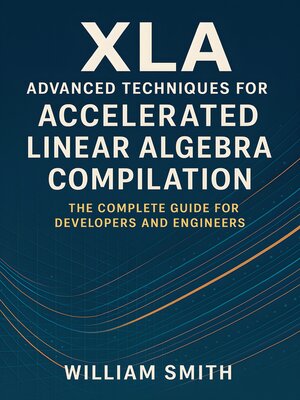
Sign up to save your library
With an OverDrive account, you can save your favorite libraries for at-a-glance information about availability. Find out more about OverDrive accounts.
Find this title in Libby, the library reading app by OverDrive.



Search for a digital library with this title
Title found at these libraries:
| Library Name | Distance |
|---|---|
| Loading... |
"XLA: Advanced Techniques for Accelerated Linear Algebra Compilation"
"XLA: Advanced Techniques for Accelerated Linear Algebra Compilation" offers a rigorous and comprehensive exploration of the XLA compiler, a cornerstone technology for high-performance numerical computing in modern scientific and machine learning workloads. Beginning with foundational concepts, the book surveys the vital role of linear algebra in computational science before delving into the architectural principles and abstractions that define XLA. Readers are introduced to the compiler's high-level optimizer (HLO), intermediate representations, and the integration pathways with leading machine learning frameworks, with careful attention given to the performance and domain-specific constraints that shape real-world applications.
The text methodically guides practitioners and researchers through advanced program analysis, transformation techniques, and low-level code generation strategies tailored for CPUs, GPUs, and emerging accelerators such as TPUs. Specialized chapters dissect cutting-edge topics such as parallelization, vectorization, backend extensibility, and distributed compilation across multi-device and clustered environments. A dedicated focus on customization empowers users to implement domain-specific operators, extend compiler backends, and inject user-driven optimizations, ensuring adaptability in the ever-evolving landscape of hardware and software co-design.
Rounding out this authoritative reference are insights into performance analysis, numerical stability, security considerations, and rigorous verification of compiled graph correctness. Real-world case studies, profiling and benchmarking methodologies, and reproducible research practices provide actionable guidance for engineers in production settings. Looking forward, the book addresses emerging trends in unified programming models, AI-assisted optimizations, and open research challenges, establishing itself as an indispensable resource for anyone seeking to master the state of the art in accelerated linear algebra compilation.







